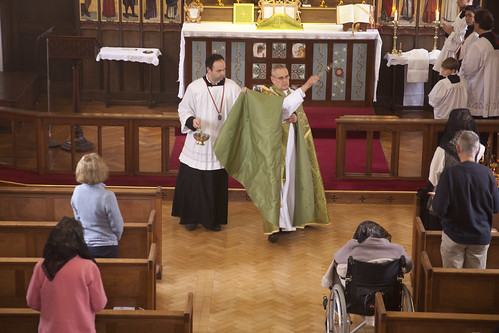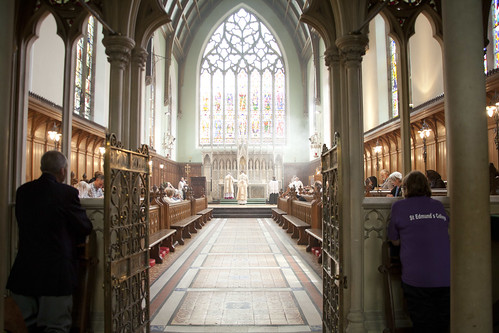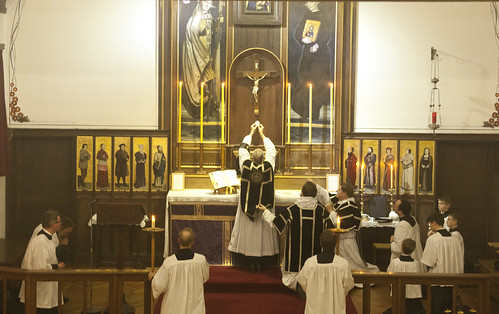This is a sort of appendix to my posts about masculinity and the Church, which was inspired by Leon Podles' book The Church Impotent. As anyone who wants to can confirm for himself, and as Podles notes in his talk (available here), but not in his book, the Traditional Latin Mass is a setting in which you will find as many men as women attending, as a matter of course, by sharp contrast with many Ordinary Form parish Masses. You also find as many men as women attending the services of the the Orthodox churches, and the Synagogues of Orthodox Judaism. In Islam, you can even find more male than female participants.
You would think that bishops and priests would seize on this and ensure that the Traditional Mass was freely available, especially for the most vulnerable group: young adults leaving Catholic schools. On the contrary, there is often a great reluctance to allow precisely this group to come into contact with the ancient Mass. The reluctance comes from something which is familiar to those promoting the liturgical tradition, which we might call the Fear of Success. If the EF is successful, popular, inspiring, that is frightening. It can only be allowed if it is going to be relatively unsuccessful. This is in part because of the inevitable bureaucratic mind-set in which anything which rocks the boat (or 'makes a mess', as the Holy Father puts it) is annoying, but also because young men being attracted by anything which does not subvert their masculinity is something which some people find very alarming. The same people who become uncomfortable about the Traditional Mass are also, frequently, uncomfortable about things like rugby and the Armed Forces. To use the kind of new-age language they might understand, they don't want all that masculine energy around. Podles suggests that some clergy, consciously or not, are content with the feminine profile of their congregations because it makes them easier to manage.
Labels
- Bishops
- Chant
- Children
- Clerical abuse
- Conservative critics of the EF
- Correctio Filialis
- FIUV Position Papers
- Fashion
- Freemasonry
- Historical and Liturgical Issues
- Islam
- Liberal critics of the EF
- Marriage & Divorce
- Masculinity
- New Age
- Patriarchy
- Pilgrimages
- Pope Francis
- Pro-Life
- Reform of the Reform
- Young people
Wednesday, December 31, 2014
Tuesday, December 30, 2014
Podles on masculinity and the Church, Part 5: the liturgy
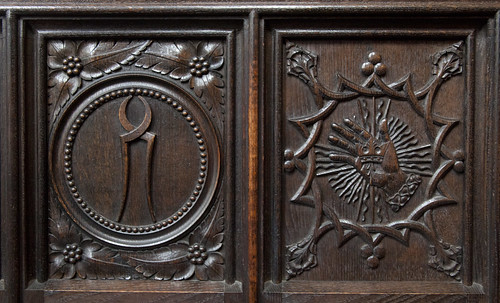 |
| The pliers for the nails, and the Sacred Wounds. |
1: Leon Podles' argument about masculinity.
2: How Podles thinks the Church became feminised in the High Middle Ages
3. Doubts about Podles' historical argument.
4. The role of Rationalism and Romanticism in confirming the feminine image of the Church.
5. The liturgy, and a solution to the problem.
One of the things rather neglected by Podles is the liturgical reform. The reason is that he wants to locate the source of the problem of feminisation way, way back, in the High Middle Ages. I don't entirely disagree that some developments then had bad consequences in this regard, but it is not easy to show a clear and consistent picture of a feminised Church from then until today. The picture is complex, with counter-currents and counter-examples.
Poddles has much more to say about Protestantism in America before the 20th century than he does about Catholicism, and it is hardly surprising that the people he quotes - essentially, Evangelical preachers and those responding to them - should have had a problem with feminisation. For these preachers relied very heavily on the emotions, and the expression of emotion, and neglected the will and the intellect. This is always going to be a hard sell for men. Mgr Benson, whom I quoted a couple of posts ago, tells us that, at least in England in 1913, religious emotion was kept in check. The less fervent - including a lot of men - were reassured that belief was a matter of will and action, that is to say, the practice of the Faith. Telling such people that they ought to feel the movement of the Spirit can lead to disaster. The 18th century poet George Crabbe describes a man who wants to repent his sins, goes to a revivalist preacher, and is eventually told that the absence of such feelings is an indication that he is damned. Understandably, the poor man hangs himself.
Monday, December 29, 2014
Podles on Masculinity and the Church, Part 4: the Enlightenment
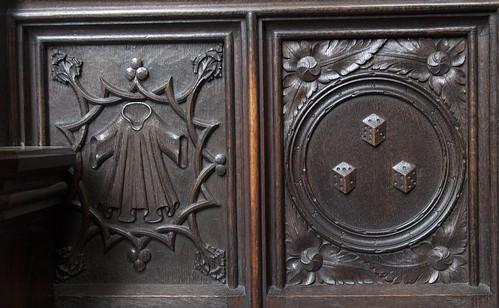 |
| The Seamless Garment; the dice used to gamble for it. |
1: Leon Podles' argument about masculinity.
2: How Podles thinks the Church became feminised in the High Middle Ages
3. Doubts about Podles' historical argument.
4. The role of Rationalism and Romanticism in confirming the feminine image of the Church.
5. The liturgy, and a solution to the problem.
The Enlightenment is a huge subject, but in the form in which it most affected the Catholic Church most directly it was Rationalist, and exulted Reason above the emotions. As time went on it was increasingly sceptical of religion, and in France it was associated with anti-clericalism. It took as its starting-point the Protestant separation of Faith and Reason. Since everything it didn't like was lumped together as anti-rational, the emotions and Faith became identified. The Church was associated with the feminine, and the feminine was denigrated.
Sunday, December 28, 2014
Podles on masculinity and the Church, Part 3: what didn't go wrong
 |
| The mocking of Christ; Veronica's handkerchief. |
1: Leon Podles' argument about masculinity.
2: How Podles thinks the Church became feminised in the High Middle Ages
3. Doubts about Podles' historical argument.
4. The role of Rationalism and Romanticism in confirming the feminine image of the Church.
5. The liturgy, and a solution to the problem.
Western spirituality took an emotional and interior turn in the High Middle Ages. This is undeniable; you can see it in the art and in the devotional manuals. Podles tells us that the interior life and the emotions are things with which women are more comfortable than men; men, he says, disclose themselves through action, women through words. That may be true, but to take one thing at a time, emotions are not the exclusive preserve of women, and an integration of the emotional life into spirituality is not a bad thing. Jesus expressed strong emotions - joy, anger, grief: there is nothing unmanly about that. They are not, from any point of view, suffocating feminine emotions. Again, the emotional religious art of the Gothic and indeed Baroque eras is not, as Podles appears to suggest, concerned exclusively with the overheated maternal instincts of cloistered nuns contemplating the Crib; the focus is actually on the Passion. (That is why I am decorating these posts with the Instruments of the Passion carved into the choir stalls of a former Anglican convent.) To use one of Podles' favourite words, the focus of this devotion is agonic (as in agonistic), and to that extent potentially appealing to men.
Saturday, December 27, 2014
Female Pastoral Administrator for parishes in Norhampton Diocese
Update: I've just been told, by the by, that the church of the Catholic parish of Christ the King in Milton Keynes is in fact shared with the Anglicans. The Anglicans, by a nice coincidence, have a lady vicar there.
From The Vine, the diocesesan newspaper of Northampton Diocese, November 2014.
'Remember, you saw it here first. She can do everything a priest can do, except anything that a priest does do. Sister Yvonne Pilarski SSCJ is a pioneer, even an experiment. At Bishop Peter [Doyle]'s request, she has taken over as Pastoral Administrator of the parishes of Christ the King, Milton Keynes, and St Bede, Newport Pagnell. Along with Sister Eileen McElhone, she moved into the presbytery at Kents Hill on September 25, and was commissioned by Bishop Peter at the Masses on September 28. Fr Malcolm Bull will add Newport Pagnell to his responsibilities in Olney. Fr Paul Hardy will add ministry at Christ the King to his work at St Edward's, Milton Keynes. They have the help of two Permanent Deacons. But, Sister Yvonne is in charge!'
From The Vine, the diocesesan newspaper of Northampton Diocese, November 2014.
 |
| Uncaptioned photo accompanying the story on the front page of The Vine. |
Podles on Masculinity and the Church, Part 2: what went wrong
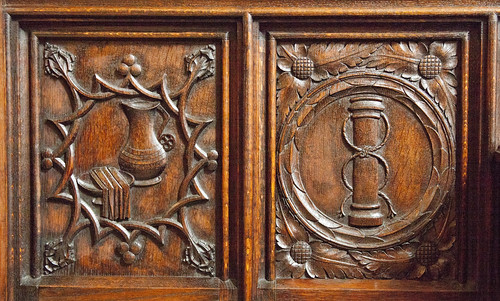 |
| Pilate washes his hands; the pillar of the flagellation. |
1: Leon Podles' argument about masculinity.
2: How Podles thinks the Church became feminised in the High Middle Ages
3. Doubts about Podles' historical argument.
4. The role of Rationalism and Romanticism in confirming the feminine image of the Church.
5. The liturgy, and a solution to the problem.
In the first post of this series I presented Podles' very simple understanding of what masculinity is. Since men don't give birth, it is a biological and cultural imperative that they be stimulated to face other kinds of dangers for the good of the community, the kinds of dangers, in fact, for which their physique and psychology fits them. I think this is pretty difficult to dispute, even if some people won't like it. But it means that there is a ineradicable idea of masculinity as achieved and not as given, the importance of which means that men must in some sense distance themselves from the feminine realm. The molly-coddled male has not achieved masculinity: he hasn't made it as a man. And he is unlikely to achieve much of value for the community.
It should be noted that the masculine has a 'parabolic trajectory': having separated himself from the feminine, the man can return to it, in some sense, making connection with the feminine in romantic love and family life. But he remains distinct from it, and remains in danger of losing his masculinity if he loses this distinctness in uxoriousness.
Wednesday, December 24, 2014
Tuesday, December 23, 2014
Podles on masculinity and the Church: Part 1
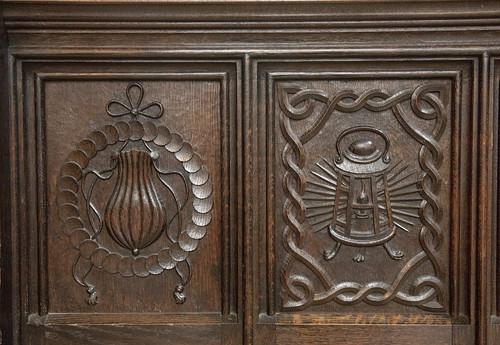 |
| Judas' payoff, and a lamp for those going to arrest Jesus in the Garden of Gethsemane |
1: Leon Podles' argument about masculinity.
2: How Podles thinks the Church became feminised in the High Middle Ages
3. Doubts about Podles' historical argument.
4. The role of Rationalism and Romanticism in confirming the feminine image of the Church.
5. The liturgy, and a solution to the problem.
I think this is an immensely important issue, so I'm going to devote a few posts to it; this one, and then some more after Christmas. In this one, I'm just going to give Podles' most basic claim, about how masculinity works. It is quite simple, fits into many obvious facts about culture, and has huge implications.
It can be expressed in three easy steps.
1. In order to attain some standing, respect or acceptance in a community, an individual needs to make some kind of contribution to it. Especially valued, obviously, are valuable contributions make at the cost of great effort, pain, and risk to life.
Monday, December 22, 2014
More on those nuns: how female religious life was lost
 |
| St Warburgh |
Malachi Martin The Jesuits explains what happened to the the most presigious and influential religious order. Did you know that 100 Jesuits petitioned to form a separate order with a traditional Jesuit ethos? There's nothing liberal fascists hate more than the idea that they'll be in direct competition with a non-liberal alternative.
Michael Rose Goodbye Good Men is about seminaries in the USA, with a few references further afield. I've heard the methodology of the book criticised, but it tells the story well enough. The disastrous collapse of moral and academic standards, and the appalling liturgical abuses, of the 70s, 80s and 90s has not been entirely undone, but things are improving. In the meantime, of course, the loss of the good vocations from those years can never be undone.
Ann Carey Sisters in Crisis is about religious sisters (active, not contemplative, and mostly 'sisters', not, technically, nuns). Like Malachi Martin she talks in some detail about the things happening even before the Council which began to undermine the sisters, and were crucial to the rapid spread of liberal innovations during and after it.
Sunday, December 21, 2014
Loftus and the time-warp
 |
| Superb stained glass from the Comper chapel of the All Saints Convent in Cowley, Oxford, now occupied by the Conventual Franciscans. |
Mgr Basil Loftus treats us to one of his historical paradoxes (The Catholic Times, Christmas double issue, dated '19th and 26th December'):
St Anselm, the Archbishop of Canterbury when William the Conqueror invaded Britain - so I don't need to tell you the date - wrote...
Well blow me, I thought it was the Saxon, Archbishop Stigand, who was governing the see of Canterbury in 1066. He was succeeded by Lanfranc in 1070, and St Anselm didn't take up the post until 1093: not only some time after the Conquest, but several years after William the Conqueror had died (in 1087).
Saturday, December 20, 2014
Christmas offer for priests from the Latin Mass Society
Friday, December 19, 2014
Christmas Masses in and near Oxford
 |
| Sung Mass at Hethe |
We had our second EF Missa Cantata in Holy Trinity, Hethe, on Sunday 7th December.
On Saturday 20th, at 7am, there will be a Votive Mass of Our Lady, the Mass Rorate, illuminated by candles, in the Oxford Oratory.
This Sunday, 21st, there will be a Missa Cantata in SS Gregory & Augustine's, Oxford, at 12 noon.
On Christmas Day there will be another Sung Mass in Hethe, at 12 noon (location).
There will also be a Low Mass at Hethe at noon on Christmas Eve.
Do come along to these Masses if you can. There is more to Christmas than shopping and overindulgence, after all.

Support the work of the LMS by becoming an 'Anniversary Supporter'.
Thursday, December 18, 2014
Investigation of the American sisters: deja vu
 |
| Meet the radical young liberals |
They are heading down the pan, and the people writing this report aren't terribly interested in working out why, either to make suggestions for reform or as a warning to others. The fact that many of the sisters have completely abandoned community life, neither praying nor living together; the fact that many of them have adopted work which has no specific relation to their community's charism nor indeed to the Catholic Church; the fact that many have discarded any semblance of religious dress and any semblance of the Office; the fact that many of them have lost the Faith: these facts would explain it. We don't really need a report from the Vatican to tell us, it is all in Ann Carey, 'Sisters in Crisis', now in a second edition.
Sunday, December 14, 2014
Loftus goes into orbit
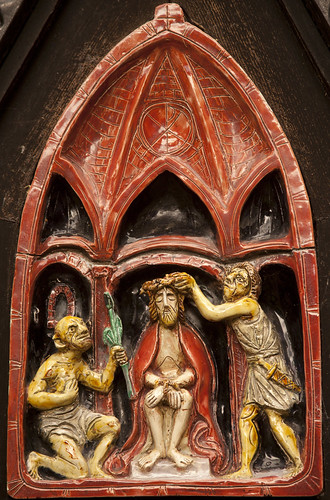 I have been neglecting Mgr Basil Loftus on this blog, recently, but for some reason he has chosen to attack me specifically in his latest column in the Catholic Times (12/12/14). I'm not going to write about that here and now, however, except to say that his claim about dissension within the Latin Mass Society on his account is pure fantasy.
I have been neglecting Mgr Basil Loftus on this blog, recently, but for some reason he has chosen to attack me specifically in his latest column in the Catholic Times (12/12/14). I'm not going to write about that here and now, however, except to say that his claim about dissension within the Latin Mass Society on his account is pure fantasy.I am in good company: as well as the familiar target of Cardinal Burke, Loftus takes aim at the ''St Peter' priests' who he says are active in Shrewsbury and Lancaster dioceses. He is, presumably, confusing the Fraternity of St Peter, who are based in Portsmouth diocese, with the Institute of Christ the King Sovereign Priest, which works in Shrewsbury and Lancaster. Perhaps he means both, anyway. He draws in the Sons of the Holy Redeemer too.
One only has to think, in our own countries, of the 'Tridentine' Redemptorists in the Orkney Islands - almost but not quite visible across the water from my study window as I write this. There are other communities of 'St Peter' priests in the dioceses of Shrewsbury and Lancaster who are not only totally cocooned in pre-Vatcian II rubrics and pre-Pius XII liturgical outlook, but who enjoy immunity and isolation from the 99.9 recurring per cent of the rest of the Catholic Church, as though it were a contagious disease against which their baptism has not vaccinated them. Because, as [Robert] Mickens avers, this goes to ecclesiology, not just to maniples, lace and cappa magnas, then [sic] it becomes very worrying.
As if this at least quasi-schismatic ecclesiology were not enough to link today's crypto-Lefebvrists with the second and third century perfectionist heresies, they go on in their language, not least on innumerable 'blog-sites', to ape the rudeness of those predecessors by the way they have, to quote Mickens, constantly "mocked and scorned those with whom they disagree."
Is this the same Robert Mickens who was sacked from The Tablet for his being rude about Pope Benedict on Facebook, hosting a discussion on his page which looked forward to his death? The very same.
Are these religious institutes referred to, particularly the Fraternity of St Peter and the Sons of the Most Holy Redeemer, not established, under the authority of the Holy See, precisely in order to avoid any danger of schism and 'Lefevbrism', at great personal cost to the founding members? They are indeed.
However, I think Loftus' tirade needs not so much refutation as a wider audience, for its absurdity to receive the ridicule it deserves. Although I am not a lawyer, it looks to me very much like libel, and especially the canon legal equivalent. Canon 220 says:
No one is permitted to harm illegitimately the good reputation which a person possesses nor to injure the right of any person to protect his or her own privacy.
To put Mgr Loftus' complaints about other peoples' rudeness in a proper context, I have decided to make publicly available a compilation of quotations I have made from his writings. You can download it as a PDF here.
Support the work of the LMS by becoming an 'Anniversary Supporter'.
Thursday, December 11, 2014
LMS Ordo on sale
An Ordo tells you what Mass must or can be celebrated each year: feasts, and seasons, noting the correct liturgical colour, whether the Gloria or the Creed is said, and so on.
The Latin Mass Society's Ordo is the only one to include all the local (National and Diocesan) feasts of England and Wales. We have a large number of these, so this is important.
You can buy the edition for 2015 now from the LMS online for £8.99.
Support the work of the LMS by becoming an 'Anniversary Supporter'.
The Latin Mass Society's Ordo is the only one to include all the local (National and Diocesan) feasts of England and Wales. We have a large number of these, so this is important.
You can buy the edition for 2015 now from the LMS online for £8.99.
Support the work of the LMS by becoming an 'Anniversary Supporter'.
Wednesday, December 10, 2014
A new Norbertine priest
Fr Stephen Morrison OPraem - of the Canons Regular of Premontre, the Premonstatensians or Norbertines - was ordained on Saturday, and I went to his first public EF Mass on Monday, for the feast of the Immaculate Conception, which is the patronal feast of the Norbertines' church in Chelmsford.
It was glorious! In so many ways. I have known Fr Stephen since he was an undergraduate in Oxford; he's not the only man called to the priesthood who has done a stint with the Oxford Gregorian Chant Society. The church was filled with family, friends, parishioners and well-wishers.
I've stolen these photos from Mark Lambert, who was there: see more on his blog.
Support the work of the LMS by becoming an 'Anniversary Supporter'.
Tuesday, December 09, 2014
Anniversary Requiem for Peter Geach
 |
| Peter Geach with his wife Elizabeth Anscombe |
Peter Geach, the eccentric but brilliant and influential Catholic philosopher, and husband of the late Elizabeth Anscombe, died a year ago, and an old friend of his is organising a Traditional Requiem for him in St Bede's, Clapham Park.
Do come along for this, or at least remember him in your prayers. Here's an obituary.
Church of St Bede, Clapham Park, Thornton Rd, SW12 0LF
Nearest Tube: Clapham South
Nearest Overground: Streatham Hill
Nearest Bus Routes: 137 from Oxford Circus via Knightsbridge, Sloane Square, 50 from Stockwell
Support the work of the LMS by becoming an 'Anniversary Supporter'.
Support the work of the LMS by becoming an 'Anniversary Supporter'.
Monday, December 08, 2014
Comment on masculine authority from Alastair Roberts
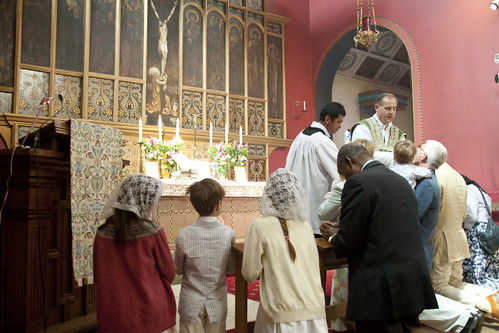 |
| Holy Communion at St Mary Magdalen, Wandsworth, with Fr Martin Edwards |
What is missing from his account is reference to the sacramental realities which are connected with the issue of the complementarity of the sexes, in Catholic theology. There is a danger, however, which can be seen in Catholic treatments of these issues, of fixating on the issue of sacramental validity, and regarding everything else as unimportant. Women can't be ordained priests: that's the end of the argument, it often seems, and we might as well give way on all the manifestations of the Church's teaching other than the ordination of women itself. This is part of a legal-positive drift which I have criticised before as a feature of neo-conservative thinking, amazingly illustrated the other day by Cardinal O'Malley saying that, if he had founded the Church, he would have 'loved' to have had women priests. No: it was not just an arbitrary and incomprehensible decision by Our Lord to ordain only men, which we can like or lump. Grace perfects Nature, it does not destroy or replace Nature. Leave the idea of a depraved Nature and an arbitrary Divine Will superimposed upon it to the Calvinists. This Evangelical reflection, below, ought to shame us for the superficiality of our usual discussions.
In passing I would like to note two important Catholic treatments of these issues. Manfred Hauke's classic work, 'Women in the Priesthood?' is an exhaustive investigation of the symbolic role of the feminine in the Old Testament, New Testament, and beyond. My criticisms of the work are, first, that he fails to see the full importance of the two concrete manifestations of complementarity which are contested in Catholic liturgical practice today, namely the service of the Altar and headcoverings. And second, his concern, like that of St John Paul II, is so focused on women that it tends to neglect men. You can't talk about complementarity without talking about both sides.
The other work is Leon Podles 'The Church Impotent: the Feminization of Christianity'. I have criticisms of this as well, and I intend to discuss some of his ideas in future posts. But you can read the whole book online, and it contains a lot of fascinating material, particularly about the nature of masculinity and how that fits in with spirituality.
--------------------------
A few thoughts, from a Protestant who is mostly agreed with the post above:
1. In Scripture, the primarily command to husbands isn’t to exercise authority over their wives and families, but to love them. This, I believe, is worthy of note.
Labels:
Masculinity,
Masculinity and the Church,
Sociology
Saturday, December 06, 2014
The Complementarity of the sexes: embarassing but indispensible
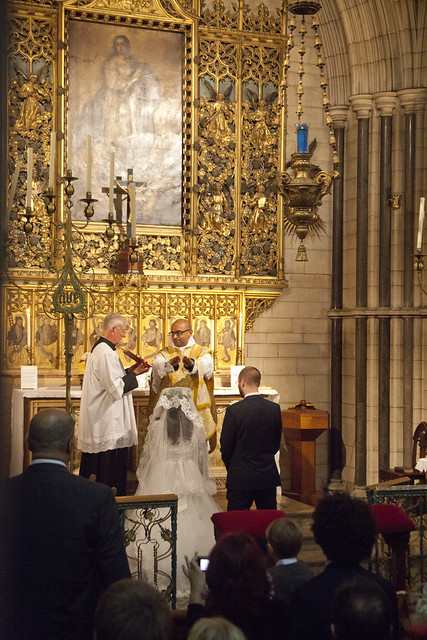 |
| Nuptial Blessing: much of it given to the Bride alone. Complementarity, not symmetry. |
Now, people have begun to notice that same-sex marriage is very difficult to resist if you accept contraception. Accept that sex, and indeed marriage, needn't have any connection with procreation, and it becomes impossible to explain what is wrong with homosexual sex, and homosexual marriage. The resistance of Evangelical Christians to SSM is, therefore, very difficult to maintain. Well, we have resisted that concession, so perhaps we are ok.
Friday, December 05, 2014
Headcoverings: a new Position Paper from the FIUV
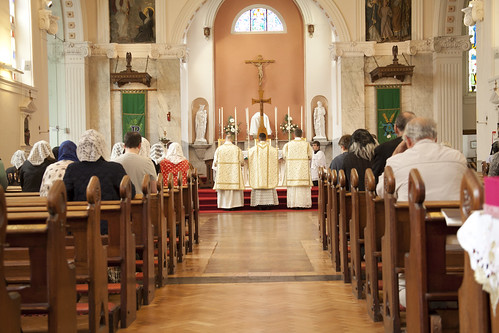
Today I am publishing a Position Paper on head covering in church: go over to Rorate Caeli to read it. This post is by way of some additional commentary on the subject.
The issue of ladies covering their heads in church may seem like a hornet's nest that we should just avoid kicking. For peculiar personal reasons the very idea causes apoplexy among some older, liberal women. It makes the traditional movement seem not just old-fashioned but wedded to an anti-feminist set of ideas which puts it beyond the pale of civilised discussion for great sections of the population. The idea that there might be some kind of moral pressure, if only from the example of others, on women new to the Traditional Mass that they adorn themselves with some absurd lace article, is obviously going to put loads of people right off the whole thing. So why don't we just shut up about it? That would obviously include not continuing the practice, since it is the very sight of women and girls in these things which draws attention to it first and foremost.
Wednesday, December 03, 2014
Baseball hats in church in Hexham and Newcastle
There has been a lively correspondence in the diocesan newspaper of the diocese of Hexham and Newcastle about this photo, which appeared illustrating a story about a 'Youth Village', a gathering organised by the diocese' 'Youth Ministry'.
It apparently did not occur to the editors of The Northern Cross that there was anything amiss in this picture of a young man presenting the gifts to Bishop Cunningham, and in response to a letter pointing out that something was amiss (which is on the website here, for the time being) there came an avalanche of letters defending the young man, Which of course rather misses the point. Evidently, no one in the Yoof Ministry had catechised him about the significance of men taking off their hats in church. I wonder if they had catechised him about anything else. That certainly isn't the young man's fault. You can't reap where you have not sown.
It apparently did not occur to the editors of The Northern Cross that there was anything amiss in this picture of a young man presenting the gifts to Bishop Cunningham, and in response to a letter pointing out that something was amiss (which is on the website here, for the time being) there came an avalanche of letters defending the young man, Which of course rather misses the point. Evidently, no one in the Yoof Ministry had catechised him about the significance of men taking off their hats in church. I wonder if they had catechised him about anything else. That certainly isn't the young man's fault. You can't reap where you have not sown.
Tuesday, December 02, 2014
The Chalice and hygiene
I have been
following the correspondence about receiving from the chalice. I qualified as a
dentist in 1959 just as “reusable needles” passed into history but boiling water “sterilisers”
were the norm.
Over the years,
the worries concerning cross-infection became more dominant and the use of
autoclaves became essential. Soon after, the Church permitted Reception of
Communion under Both Kinds.
I well remember
discussing with a priest that I felt this was odd because HIV/Aids was becoming
evident and the method of its spread was not then known. He actually agreed but
we left it there.
We now know that
HIV/Aids is not spread orally but herpes and hepatitis can be and nowadays we
have the arrival of ebola which is transmitted in body fluids.
I have been
asked on many occasions why I do not take the chalice and my standard reply is
that I have spent thousands of pounds preventing, as far as I can,
cross-infection and wiping the chalice between communicants cannot be construed
as such a practice. Intinction must be a better solution. Perhaps we can look
forward to it becoming standard practice in the near future.
Paddy Chronnell, Cheltenham, Gloucestershire
Monday, December 01, 2014
High Mass of Requiem in St Benet's Hall
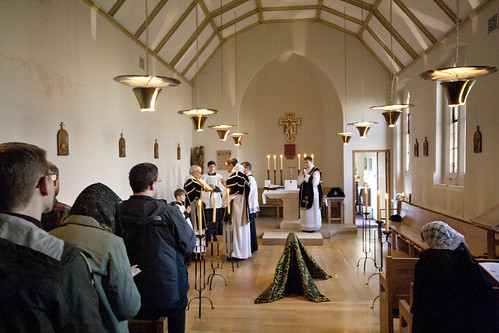
Every Catholic institution should pray for those who once collaborated in its work and have go to their rewards. The Requiem Mass of the Extraordinary Form is a particularly beautiful and theologically rich expression of the Church's concern for the dead. This is the third annual Requiem I have organised there.
Sunday, November 30, 2014
Oxford Graduates: Oxford's dead need YOU
 |
| The Altar in the St Thomas More Chapel set up for the EF Mass. |
Any Oxford graduate, former visiting student, or current student, or current or former employee, who would like to support a petition for a Traditional Sung Requiem in the Catholic Chaplaincy for their deceased predecessors and contemporaries, please email
info@lms.org.uk
with 'Oxford Chaplaincy' as the subject and your name, address, and current or former college or whatever.
Saturday, November 29, 2014
Requiem for Alison Davis, 3rd Dec in Corpus Christi Maiden Lane
.jpg) Corpus Christi Maiden Lane, Wednesday 3rd December. Mass will be at 6:30pm and will be High Mass, with Deacon and Subdeacon. More details here.
Corpus Christi Maiden Lane, Wednesday 3rd December. Mass will be at 6:30pm and will be High Mass, with Deacon and Subdeacon. More details here.Alison Davis was a truly remarkable woman, whose life illustrates the power of grace to turn intolerable suffering into something beautiful. You can read her Telegraph obituary here and a blog dedicated to her here.
On the first anniversary of her death, let us lend her our prayers. And with all the Holy Souls, may she pray for us too.
Support the work of the LMS by becoming an 'Anniversary Supporter'.
Thursday, November 27, 2014
Position Papers: 2nd Edition published of hard-copy book
 Over the last three years, the Foederatio
Internationalis Una Voce, the world-wide federation of Una Voce groups, has
been publishing executive summaries on specific aspects of the Traditional
Mass: why we don’t have Altar Girls, why we don’t give Communion from the
Chalice, why we worship towards the East, why we have a season of preparation
for Lent, what happened to Holy Week in the 1950s, and many, many more: 23
short articles, with lots of references to recent official documents, and the
latest scholarship.
Over the last three years, the Foederatio
Internationalis Una Voce, the world-wide federation of Una Voce groups, has
been publishing executive summaries on specific aspects of the Traditional
Mass: why we don’t have Altar Girls, why we don’t give Communion from the
Chalice, why we worship towards the East, why we have a season of preparation
for Lent, what happened to Holy Week in the 1950s, and many, many more: 23
short articles, with lots of references to recent official documents, and the
latest scholarship.
They have been published individually online, but here
is you chance to buy the book, with all 23 little papers. The perfect gift for
your pastor, the perfect briefing for those who don’t have time to read a long
tome but want a carefully researched answer to the questions people ask about
the Vetus Ordo.
The series is on-going; look out for the next papers
which will be published first on Rorate Caeli blog.
PRAISE FOR THE FIUV PAPERS:
'let me say simply that reading and ruminating over
the FIUV Papers on the Liturgy could serve as a marvellous primer for how to
address what often ends up being controversial in a very different and
respectful manner.' Archbishop Thomas Gullickson, Papal Nuncio to the Ukraine.
Wednesday, November 26, 2014
Bill Murray on the liturgical reform
 I'm not the sort of person who regards the words of the famous as having more weight than the words of people who actually know what they are talking about. But this is a personal impression, and it is interesting.
I'm not the sort of person who regards the words of the famous as having more weight than the words of people who actually know what they are talking about. But this is a personal impression, and it is interesting.'I tend to disagree with what they call the new mass. I think we lost something by losing the Latin. Now if you go to a Catholic mass even just in Harlem it can be in Spanish, it can be in Ethiopian, it can be in any number of languages. The shape of it, the pictures, are the same but the words aren’t the same.”
Isn’t it good for people to understand it? “I guess,” he says, shaking his head. “But there’s a vibration to those words. If you’ve been in the business long enough you know what they mean anyway. And I really miss the music – the power of it, y’know? Yikes! Sacred music has an affect on your brain.” Instead, he says, we get “folk songs … top 40 stuff … oh, brother….”'
The whole interview is here.
Support the work of the LMS by becoming an 'Anniversary Supporter'.
Tuesday, November 25, 2014
LMS Wall Calendar
ORDER YOUR COPY TODAY!
The Society's ever-popular wall calendar, showing feast days on their traditional dates, according to the 1962 Missal. In addition to the feasts in the universal calendar, we have also included many English and Welsh saints that are only celebrated locally.
• Feast Days in accordance with the 1962 Missal
• Pictures of Traditional Catholic events in England and Wales and overseas
• More space to write your appointments etc.
• Spiral-bound with hanging loop (easy to change months)
• Printed on low-reflective art paper
• Spacious A3 size (no more staples across the centre)
£8.00 plus p&p Click here
Support the work of the LMS by becoming an 'Anniversary Supporter'.
• More space to write your appointments etc.
• Spiral-bound with hanging loop (easy to change months)
• Printed on low-reflective art paper
• Spacious A3 size (no more staples across the centre)
£8.00 plus p&p Click here
Sunday, November 23, 2014
Photos from the Summorum Pontificum Rome Pilgrimage

These are from Mass celebrated by Cardinal Burke in the Chapel of the Throne in St Peters, 30th October. The full set, from the photographer Christopher Owens, is here.

Saturday, November 22, 2014
The problem of censorship
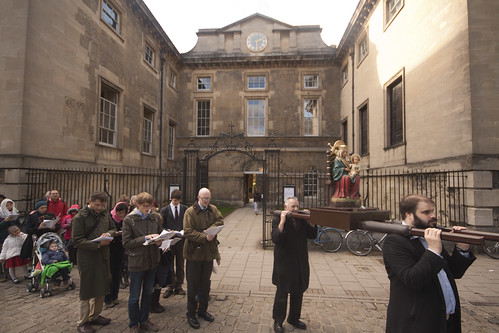 |
| LMS Oxford Pilgrimage procession outside Worcester College. |
Readers can go over there and see for themselves if I am exaggerating. Mr Squirrel tells us that, shock, horror, 'there are some individuals whose presence in a space can make people feel unsafe.' And, of course, 'universities are also our homes'. Ergo, the touchiest person in a University of over 10,000 souls should have a veto over every public conversation in the place - assuming this touchy person is touchy in a politically correct way. At least, Mr Squirrel has better be assuming that, or else disagreement between the touchy could lead to the exactly kind of debate Mr Squirrel is trying to suppress.
Friday, November 21, 2014
Saying goodbye to the Salve
Wednesday, November 19, 2014
Free Speech - Oxford style

On Tuesday a debate organised by the Oxford Students for Life was cancelled after what can only be described as a campaign of intimidation by pro-abortion extremists. (Here is Tim Stanley, one of the advertised speakers, on the circumstances.) Oxford Students for Life is a student society within Oxford University, the debate was to take place in a room they had booked in Christ Church, a college of the University, and it was ultimately cancelled because the Christ Church authorities got scared as the prospect of protesters turning up; as they expressed it on Facebook, since taken down:
We thought we should go and say hi! Bring your friends, and if you want take along some non-destructive but oh so disruptive instruments to help demonstrate to the anti-choicers just what we think of their ‘debate’.
Welcome to an elite university in Britain in 2014.
LMS Confirmations at Spanish Place, 2014
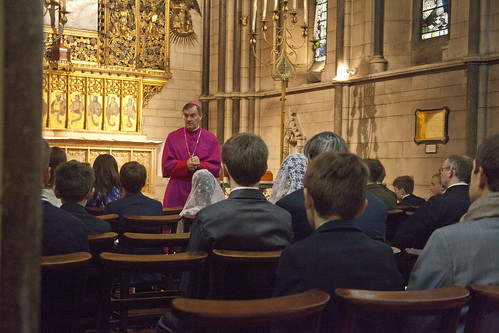 |
| Bishop Arnold addresses the confirmands before the ceremony. |
Tuesday, November 18, 2014
The Traditional Mass and the liturgy of the Christian East
Rorate Caeli to read it.
Consistently since the time of the great Pope Leo XIII, and of course frequently, if not completely consistently, before that, the Holy See has presented itself as a special friend of the Christians of the East, and of their liturgical traditions. Faced with a complex set of groups, some in communion with the Holy See and some not, with distinct liturgical, spiritual, and artistic traditions, Popes, and the Second Vatican Council, laboured to emphasise that they valued these traditions, and that no compromise of them would ever be necessary for dissident groups which wished to be reconciled to the Holy See. Non-Latin Rite Catholics could help with this project by their own fidelity to their traditions, in many cases these being exactly the same traditions as those followed by churches not in communion. Were the Greek or Russian Catholics, for example, to 'Latinise' themselves, change their liturgical practices, their church architecture, their artistic traditions, their spirituality, to conform more closely with what is typical of the Latin Rite, this would be most regrettable, because it would create the impression that once you come under the authority of the Pope you will sooner or later bid farewell to the traditions of the Fathers.
Consistently since the time of the great Pope Leo XIII, and of course frequently, if not completely consistently, before that, the Holy See has presented itself as a special friend of the Christians of the East, and of their liturgical traditions. Faced with a complex set of groups, some in communion with the Holy See and some not, with distinct liturgical, spiritual, and artistic traditions, Popes, and the Second Vatican Council, laboured to emphasise that they valued these traditions, and that no compromise of them would ever be necessary for dissident groups which wished to be reconciled to the Holy See. Non-Latin Rite Catholics could help with this project by their own fidelity to their traditions, in many cases these being exactly the same traditions as those followed by churches not in communion. Were the Greek or Russian Catholics, for example, to 'Latinise' themselves, change their liturgical practices, their church architecture, their artistic traditions, their spirituality, to conform more closely with what is typical of the Latin Rite, this would be most regrettable, because it would create the impression that once you come under the authority of the Pope you will sooner or later bid farewell to the traditions of the Fathers.
Monday, November 17, 2014
'Resurgent in the Midst of Crisis'
I'm quoted in the blurb for this book; I have had the chance to read it in advance of publication and I recommend it very much. You can buy it with this button.
224 pages; $16.95 / £10.95

Resurgent in the Midst of Crisis:
Sacred Liturgy, the Traditional Latin Mass, and Renewal in the Church
PETER KWASNIEWSKI
Foreword by Jonathan Robinson, Cong. Orat.
SINCE THE TIME of the Second Vatican Council, the Catholic Church has experienced an unprecedented crisis of identity, symbolized and propelled by the corruption of the greatest treasure of her tradition: the sacred liturgy. The result has been confusion, dismay, devastation. To the surprise of some, however, the same half-century has witnessed a growing counter-movement of Catholics who find in the Church’s traditional liturgy a perennial witness to the orthodox faith, a solid foundation for the interior life, an ever-flowing source of missionary charity, and a living embodiment of the true Catholic spirit.

Resurgent in the Midst of Crisis:
Sacred Liturgy, the Traditional Latin Mass, and Renewal in the Church
PETER KWASNIEWSKI
Foreword by Jonathan Robinson, Cong. Orat.
SINCE THE TIME of the Second Vatican Council, the Catholic Church has experienced an unprecedented crisis of identity, symbolized and propelled by the corruption of the greatest treasure of her tradition: the sacred liturgy. The result has been confusion, dismay, devastation. To the surprise of some, however, the same half-century has witnessed a growing counter-movement of Catholics who find in the Church’s traditional liturgy a perennial witness to the orthodox faith, a solid foundation for the interior life, an ever-flowing source of missionary charity, and a living embodiment of the true Catholic spirit.
Friday, November 14, 2014
Loftus on Cardinal Burke and Victor Hugo
 |
| Jesus welcomes sinners into the Temple |
Loftus attacks Cardinal Burke in both Catholic Times columns, 7th and 14th Nov, but while the main attack is in the second, it is the first which is illustrated by a photograph of the Cardinal wearing a Cappa Magna. I wonder whether the Traditional Latin Mass Society of San Francisco, whose name is faintly legible at the bottom of the picture and presumably supplied it, realised that it was going to illustrate an attack on the man for whom they are urging a petition of thanks (go and sign it) and who appears so frequently on their website. Possibly not. They really should have done a little due diligence before agreeing - if they did agree - to their photo being reproduced in this rag.
Thursday, November 13, 2014
Calling Oxford Graduates and Employees
 |
| The Altar in the St Thomas More Chapel set up for the EF Mass. |
I presented a similar petition just over a year ago, and the then Chaplain agreed to allow such a Requiem. It took place, in the St Thomas More Chapel in the Chaplaincy, on All Souls Day 2013; it was well attended and seemed to be regarded by everyone as a great success. It would seem that for it to be repeated a formal request under the Motu Proprio Summorum Pontificum is again necessary. It would made sense for such a Requiem to be an annual event.
No other Masses in the Extraordinary Form take place at the Oxford Chaplaincy, in contrast to the Catholic Chaplaincy in Cambridge, where weekly EF Masses are celebrated in the Chaplaincy as well as elsewhere in the town.
Accordingly, I would ask any Catholic reading this, who has studied (or is studying) in Oxford or has been employed (or is employed) in some capacity in the Collegiate University or its related institutions, who can support this request, to email
info@lms.org.uk
with 'Oxford Chaplaincy' in the subject line. On the petition I would like to note the nature of your association with the University and current postal address, just to demonstrate that you are real people; current students need only note their colleges. Details from this petition will be used for no purpose other than to keep you informed of the progress of the request.
I have put more information about the petition and its history here.
Support the work of the LMS by becoming an 'Anniversary Supporter'.
Wednesday, November 12, 2014
Guild of St Clare: Goldwork Training days
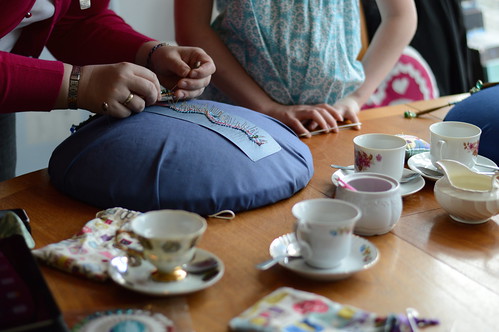 |
| Recent Lace-making training day with the Guild of St Clare |
We would like to take this opportunity to collaborate on a joint project. Some years ago the Guild created the LMS banner, which is now a very visible part of almost every major LMS event, in particular the Walsingham pilgrimage when it is carried on foot by pilgrims from Ely to Walsingham over the course of three days. It's now time that we made our own banner, for use at events like the Rosary Crusade, and we would like to incorporate contributions from as many members as possible.
Anyone attending these goldwork workshops will be invited to contribute their piece to the Guild Banner. The design is still embryonic, but we envisage several small floral medallions circling a larger picture, probably of St Clare, our patron. If you have ideas, please don't hesitate to tell us!
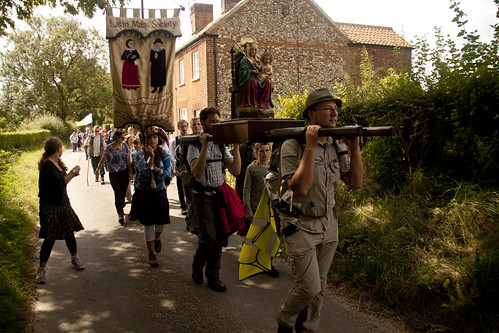 |
| The LMS Banner on the Walsingham Pilgrimage |
Monday, November 10, 2014
LMS Confirmations: 15th November
Reposted: the LMS-organised confirmation ceremony will take place this Saturday at 11:30am in St James', Spanish Place, in London.
Everyone is welcome to attend; come and say a prayer for the children and adults receiving this important sacrament.
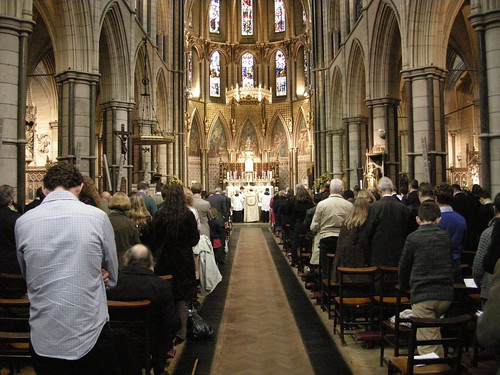
Every year the Latin Mass Society arranges the conferral of the Sacrament of Confirmation in the Extraordinary Form. It is conferred usually by an auxiliary bishop of Westminster Diocese; these photographs show Bishop Sherrington, shortly after his episcopal consecration in 2011.
Everyone is welcome to attend; come and say a prayer for the children and adults receiving this important sacrament.

Every year the Latin Mass Society arranges the conferral of the Sacrament of Confirmation in the Extraordinary Form. It is conferred usually by an auxiliary bishop of Westminster Diocese; these photographs show Bishop Sherrington, shortly after his episcopal consecration in 2011.
Sunday, November 09, 2014
November Requiems
Saturday, November 08, 2014
Remembrance Sunday in Holy Trinity, Hethe
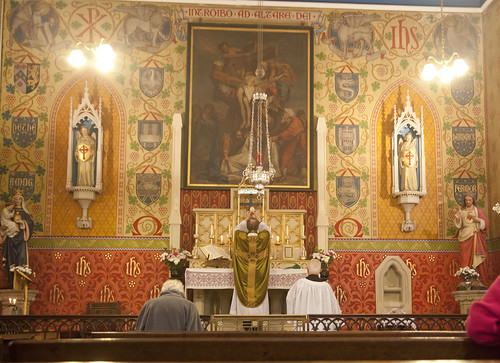
There will be a Missa Cantata in Holy Trinity, Hethe, outside Bicester, tomorrow at 12 noon, for Remembrance Sunday. This is the first Sung Mass of what I hope will be a monthly series.
We will also have a Sung Mass on Christmas Day at 12 noon.
This is the centenary year of the start of the Great War, and Sung Masses will be celebrated on this occasion in the Extraordinary Form in a limited number of places. From the perspective of a resident of Oxfordshire, you can go north to the Birmigham Oratory (you'll get a High Mass there), south to the FSSP in Reading, and east to St Bede's, Clapham Park in London. The regular EF Mass in the Oxford Oratory, at 8am, is Low. This Sunday there is another option.
This is the centenary year of the start of the Great War, and Sung Masses will be celebrated on this occasion in the Extraordinary Form in a limited number of places. From the perspective of a resident of Oxfordshire, you can go north to the Birmigham Oratory (you'll get a High Mass there), south to the FSSP in Reading, and east to St Bede's, Clapham Park in London. The regular EF Mass in the Oxford Oratory, at 8am, is Low. This Sunday there is another option.
Friday, November 07, 2014
LMS Annual Requiem, 8 Nov
This is tomorrow! Come along and join us to pray for the dead.
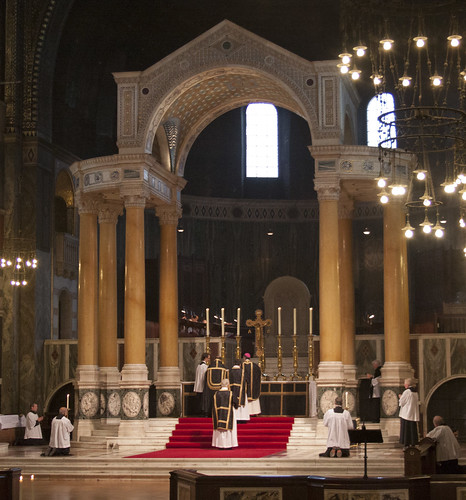
Bishop John Arnold, auxiliary of Westminster, will celebrate a Pontifical High Requiem in Westminster Cathedral at 2.00pm for the repose of the souls of all our deceased members, on Saturday 8th November.
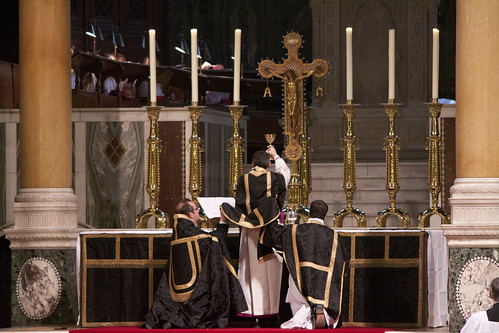
Everyone is welcome to join us. Come and see one of the Church's most solemn liturgical moments, a Mass for the dead, celebrated by a bishop in perhaps the finest church in Britain, accompanied by the Westminster Cathedral choir.
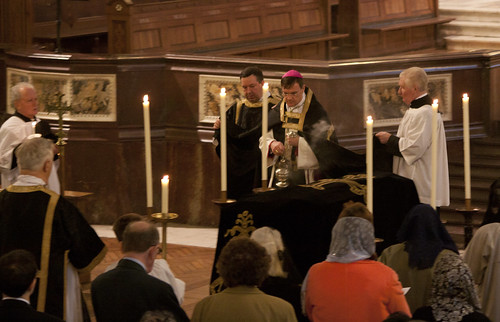
In addition to Mass the celebrant blesses a catafalque, representing the bodies of those for whom we are praying.
Support the work of the LMS by becoming an 'Anniversary Supporter'.

Bishop John Arnold, auxiliary of Westminster, will celebrate a Pontifical High Requiem in Westminster Cathedral at 2.00pm for the repose of the souls of all our deceased members, on Saturday 8th November.

Everyone is welcome to join us. Come and see one of the Church's most solemn liturgical moments, a Mass for the dead, celebrated by a bishop in perhaps the finest church in Britain, accompanied by the Westminster Cathedral choir.

In addition to Mass the celebrant blesses a catafalque, representing the bodies of those for whom we are praying.
Support the work of the LMS by becoming an 'Anniversary Supporter'.
Subscribe to:
Posts (Atom)



%2BCorpus%2BChristi-Elevation%2Bof%2Bthe%2BSacred%2BHost.JPG)





